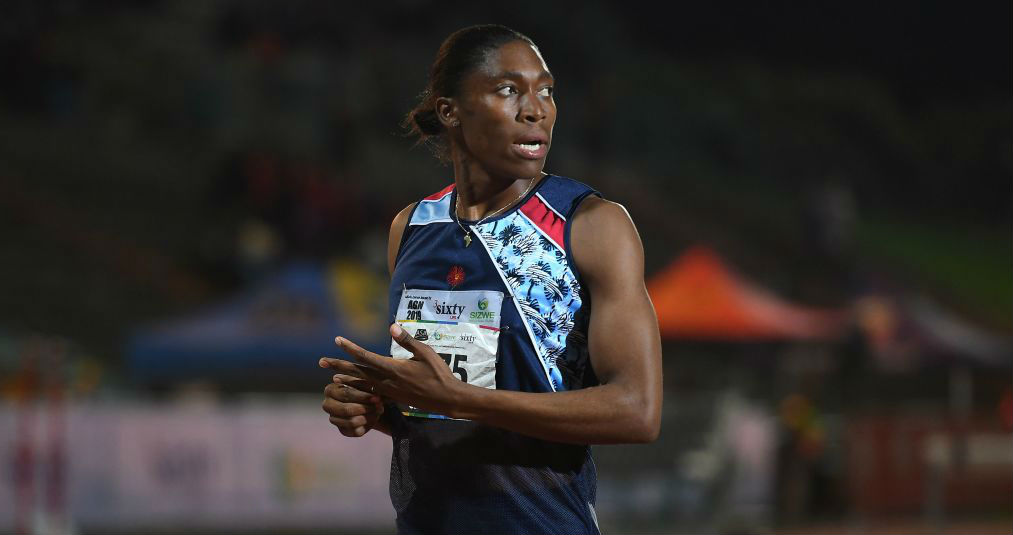Update (May 9, 2019): The International Association of Athletic Federations (IAAF) has declared runner Caster Semenya could compete in men’s competitions.
The IAAF stated their decision in a letter to the World Medical Association (WMA), reports Times Live. The letter was in response to the WMA urging doctors to refuse to honor the IAAF’s new restrictions on female runners with heightened testosterone levels.
“We have strong reservations about the ethical validity of these regulations,” said WMA president Dr Leonid Eidelman.
“They are based on weak evidence from a single study, which is currently being widely debated by the scientific community.”
The IAAF took issue with Eidelman’s assessment and insisted their decision was based on “many scientific publications and observations from the field during the last 15 years.”
They also clarified their rules and emphasized “the athlete’s right to decide (in consultation with their medical team) whether or not to proceed with any assessment and/or treatment.”
Still, they insisted athletes who refuse to alter their hormone levels “will not be entitled to compete in the female classification of any restricted event at an international competition.”
Instead, they can only compete in women’s races longer than one mile, all men’s events and intersex competitions. Semenya has been vocal about her disapproval of the regulations, according to Pink News.
“What sport teaches you is to keep pushing on despite all odds. I know life can be difficult at times but I believe there is always a way to resolve issues,” Semenya said.
“If a wall is placed in front of me, I jump it. I am going to keep enjoying my life and live it. I will keep on training and running. To me impossible is nothing.”
Original: South African track star Caster Semenya lost her appeal against rules forcing female athletes with heightened testosterone levels to take suppression medication if they want to compete.
The Court of Arbitration for Sport (CAS) ruled in favor of the International Association of Athletics Federations (IAAF), according to CNN. Under the policy, female athletes with a difference in sex development (DSD) cannot compete in women’s sports unless they take medication to lower their testosterone levels. The athletes must keep their levels below a particular measurement (5 nmol/L) for at least six months to race. If they do not comply, they must compete with men in rare events for DSD individuals or bow out. The rule was set to be enforced in November 2018 until Semenya filed an appeal.
“Regulations are discriminatory but the majority of the Panel found that, on the basis of the evidence submitted by the parties, such discrimination is a necessary, reasonable and proportionate,” the court said, according to NBC.
Even though the CAS ruled in favor of the policy, there was concern about the implementation and athlete’s ability to comply.
"The side effects of hormonal treatment, experienced by individual athletes could, with further evidence, demonstrate the practical impossibility of compliance which could, in turn, lead to a different conclusion as to the proportionality of the DSD Regulations,” the CAS said in a statement.
Blavitize your inbox! Join our daily newsletter for fresh stories and breaking news.
Semenya has hyperandrogenism, a health condition found in 5-10% of women. The excessive testosterone causes an increase in stamina, energy and physical strength. Semenya’s hormone levels have been scrutinized since she was 18 years old. She was unable to compete for some time in 2009 and 2010 because she was undergoing testing to determine if her hormone levels gave her an unfair advantage.
Bioethicist Katrina Karkazis believes the organizations don’t understand the science behind the condition.
"This ruling will simply bolster the erroneous idea that testosterone is jet fuel for athletes," she told NBC. "My own work has led me to know there is not scientific evidence to support such a regulation."
Semenya criticized the decision in a statement from her legal team.
"I know that the IAAF's regulations have always targeted me specifically. For a decade the IAAF has tried to slow me down, but this has actually made me stronger,” she said.
"The decision of the CAS will not hold me back. I will once again rise above and continue to inspire young women and athletes in South Africa and around the world."
The South African Ministry of Sport is planning an appeal.
"We are naturally very disappointed with the decision,” said a spokesperson. “This is not only against human rights but also a blow to all South Africans. We are committed to lobby other athletics bodies to stand behind us. This wasn't only Caster Semenya's case but also Athletics South Africa and we plan to study the report in detail. We plan to appeal this decision."
Semenya has 30 days to appeal the decision. The rule will be effective on May 8.
Now, check these out:
Nipsey Hussle's Sister Seeks Custody For His 10-Year-Old Daughter
Theo Shaw Of The Jena Six Is Now A Lawyer
Philando Castile's Mother Just Helped Hundreds Of High School Seniors Graduate
